Text
The Innocence of Star Trek's Pavel Chekov
[This post is me putting in words why I’m currently obsessed with Chekov, and I’m also fleshing out some of the observations I made when I watched the 80s Star Trek films.]
When I watched The Wrath of Khan back in April (I'm writing this in June 2025), all I could think about was Chekov suffering. While I was ruminating on that, I thought about the scene in Harry Potter and the Sorcerer’s Stone where Harry comes across the dead unicorn and Firenze the centaur’s explanation about why the unicorn’s death is an evil. (Film and book versions both work here).
“…it is a monstrous thing, to slay a unicorn,” said Firenze. “Only one who has nothing to lose, and everything to gain, would commit such a crime. …You have slain something pure and defenseless to save yourself, and you will have but a half-life, a cursed life, from the moment the blood touches your lips.”
This led me to a brief (and very un-academic) review of the mythology of the unicorn, particularly from medieval Europe. The unicorn is not literally defenseless. It is described as difficult to hunt, nearly impossible to chase down, and of course it fights back with its horn and hooves. However, the unicorn is both pure in itself and drawn to the pure in heart, particularly virgin maidens. The horn of the unicorn was said to purify water and neutralize poisons. To medieval Europeans, the unicorn was the consummate Christian symbol.
World History: The Unicorn Myth

Whereas medieval people had no qualms about hunting the unicorn and using its horn, in modern media killing a unicorn is considered a sacrilege against its purity. From ancient times, however, harming innocent people--particularly young and orphaned children, widows, and virgin maidens--has been seen as an act of brutality.
The ‘New Kid’
Pavel Chekov was the last ‘main character’ of the original Star Trek series to be introduced at the start of season two (1967). In “Who Mourns for Adonias?” he tells Captain Kirk that he is only twenty-two: legally an adult by our standards, but young enough to not know everything. His running gag is his inaccurate knowledge of things that were or weren’t invented in Russia: scotch whiskey, for instance.

Chekov was created for Star Trek to attract and relate to younger viewers, particularly girls and women who are into cute men. To everyone not entertained by Chekov’s good looks, he is coded as a child, a baby even. He is a ‘student’ mentored by Kirk, Spock, and McCoy.
As I have stated before, Chekov is not literally innocent in the sense that he is sinless. Instead, he is young and naïve. He is definitely a ‘fool’ for comedy purposes but also in terms of his own ignorance. A small, youthful Russian is an intentional contrast to a contrast to the hard, muscular, murderous Soviet spy stereotype. On the other hand, the Fool or unmanly hero is a staple character of Russian folklore.
Chekov’s love interests in Star Trek often appear as temptations that lead him towards bad outcomes. The most glaring example of this is Sylvie in season three’s “The Specter of the Gun”. In this episode, Captain Kirk, Spock, Scotty, McCoy, and Chekov are put into an illusion by the Melkotians in which they are outlaws in Tombstone, Arizona about to be gunned down in the infamous gunfight at O.K. Corrall. Chekov catches Sylvie’s eye, and she addresses him as her boyfriend ‘Billy’. He does not oppose her treating him like her boyfriend. One of the sheriff’s deputies loves Sylvie, however, and tells her to stay away from Chekov. Kirk also warns Chekov to stay away from her just to avoid increasing their risk of being killed by the illusion.

But Chekov encounters Sylvie again later and takes her for a walk. She asks him to marry her. It is not hard for me to think that Chekov has compassion for Sylvie, a prostitute in a primitive and savage society. Agreeing to marry her means a promise to protect her. A saloon gal is far from an innocent virgin, but asking him to marry her—to provide for her and protect her—tells me she wishes she wasn’t a prostitute. She is a damsel in distress asking for rescue.
Medieval Europeans believed that a virgin could be used to lure a unicorn out into the open so that prospective hunters could slay it. In the middle of his conversation with Sylvie, the jealous deputy returns and shoots Chekov dead. Chekov later reappears on the Enterprise alive and well. However, the cunning of the Melkotians to play on the Starfleet officers’ ethics is symbolic as well as nothing short of cruel.
Khan’s Puppet
Enter Chekov in The Wrath of Khan (1982). Longtime Star Trek fans are aware of Chekov’s history from the series as a quasi-innocent, gullible youth. Now Chekov is the first officer of the Reliant. He’s older and one would assume wiser. But a visit to the wrong planet leads him to the exiled Khan Noonien Singh.

Khan is a former dictator who doesn’t care who he hurts. He only wants to escape exile and inflict revenge on the now admiral James Kirk. Kirk’s only crime was stopping Khan’s attempted takeover of the Enterprise (in the episode “Space Seed”) and sending him into exile. Chekov and his colleague Captain Terrell are just tools to Khan.
Per Walter Koenig’s own fan theory, Khan met the young Chekov in a bad place offscreen in "Space Seed". If we assume that this is canon, then Khan remembers Chekov as young and hapless. But if that did not happen, Khan would have at least known the names of the Enterprise crew. Hurting a former colleague is the perfect knife to twist into Kirk’s back.
While Khan casually destroys other innocent lives, he intentionally uses Chekov to bring about his revenge on Kirk and ultimate return to power. This is a major plot point in The Wrath of Khan and yet it comes off as an overlooked act of cruelty in the other events of the film. Khan abuses a person he perceives as weaker than himself to a layer of emotional torture to use on Kirk before finally killing him.
Khan, like Voldemort in Harry Potter, is a fallen Dark Lord bent on returning to power. Chekov is the unicorn, the collateral damage, the one he kills to sustain himself as he works towards his goal. “Fascist” villains see themselves as justified to take whatever they feel is rightfully theirs, and there are no rules about who is harmed or how. Khan wants revenge on Kirk for standing up to him. His followers want to use the Genesis device to build a space empire like the one Khan once had on Earth. “Always the innocent are the first victims,” comments another centaur in Harry Potter and the Sorcerers’ Stone.

The Ceti worm is a particularly insidious method of execution because it is death by slow torture. It renders the victims “suggestible”: the one in control of the victim can make the sufferer do whatever they want. The loss of his own agency renders Chekov and Terrell as Khan’s puppets. Technically, while he is under Khan’s control Chekov is legally ‘innocent’ of the crimes Khan forces him to commit. But the mind control does not spare him any awareness of Khan’s actions through him or because of him. Chekov and Terrell do what they can to fight back, but there is not much they can do to escape the obvious torture and trauma.
Using Terrell and Chekov, Khan inflicts his menace onto even more innocents. The crew of the Reliant is marooned in the place of Khan’s exiles. They had nothing to do with Khan’s grudge against Kirk, and Chekov as first officer most likely knew them and cared about them. The Reliant crew is sent to a hostile planet with the Ceti worm as its only native inhabitant. Death and suffering clearly await them.
The Enterprise, meanwhile, is on a training mission with a group of young academy graduates. After the first skirmish with Khan, Admiral Kirk visits sickbay. His brilliant victory against Khan is immediately tainted by the sight of so many injured and dying young crewmen. He is present when one of the engineering crew dies—according to the extended version, Scotty’s own nephew.

Khan paints his true character in blood. He casually kills those who have nothing to do with his feud with Kirk. Chekov, on the other hand, is a reminder of how that feud began. Khan leaves Chekov and Tarrell on Regula-1 to lure Kirk into a false sense of security, and then he orders the two Starfleet officers to shoot their own admiral—that is, he orders Chekov to murder his former captain who regards him as a friend.

A Quiet Hero
Chekov is rescued from Regula shortly after this first skirmish. No doubt while he was recovering in sickbay he noticed the casualties from the earlier skirmish. No doubt he also sees the first injured and dying arrive during the early stages of the battle between the Enterprise and the hijacked Reliant. He is also just reeling from the suicide of Captain Terrell, and damaged from whatever the Ceti worm did to his brain. I do not doubt that Chekov struggled with blaming himself—if he and Terrell hadn’t beamed down to Ceti Alpha V in the first place, unaware of who was exiled there, then none of this death and suffering would have happened.

He had every right to sit out the battle at the climax of the film. And yet he didn’t. Because he is a good person. And per my own interpretation, if he blamed himself, he had to do what he could to resolve the crisis he had started.

In the end, the only salvation from—Chekov’s salvation for his mistake—is the death and sacrifice of Spock, his longtime friend and mentor.
Again, Chekov had every right to sit out what came next. But in The Search for Spock (1984), Chekov joins Kirk in hijacking the Enterprise. The purpose of this hijacking is to save Spock’s body and McCoy’s mind. Chekov is repairing the consequences of his ‘mistake’ in the previous film and repaying the favor: saving Spock’s life in return for saving his own.
Fast forward some months later to The Voyage Home (1986). The team travels back in time to the twentieth century. Kirk’s friends are like children in this setting, total strangers to the world of the past and its primitive technology. While this is mostly played up to comic effect, there is a serious consequence when Chekov, an ethnic Russian, is sent to the US Naval base to collect nuclear power from a naval warship.

Pavel Chekov is anything but a Soviet spy. He only needs power from the warship’s nuclear reactor to get the HMS Bounty back to his own century in order to save the future from the Cetacean probe. His intentions could not be any more noble. But to the US Navy, he is a national security threat simply for being a Russian on Federal property. All they see is his name and all they hear is his accent, and they project on him their suspicions of ill intent, espionage, and violence. Chekov did come to the navy ship armed, but his phaser fails to work, and he throws it away and escapes only to land on concrete.
Kirk and McCoy rescue Chekov from the hospital and from likely fatal twentieth-century medical treatment. Chekov helps pilot the Bounty back to the 23rd century. He stands trial for mutiny with his crew. I’ve said it before but I will say it again: he suffered a lot, but he still chose to do right by his captain and his friends, and they stood with him.
Chekov’s arc in The Voyage Home is a very glaring statement about how political hostilities tempt humans to dehumanize each other: in thinking we must hunt down and kill monsters, we slay unicorns. I would add that with renewed US-Russian hostilities in the 2020s it remains a warning to this day.
As for Chekov himself, sometimes being innocent is simply minding your own business but being in the wrong place at the wrong time. Chekov in the 80s Star Trek films remains a hapless figure, and as such becomes a living martyr to the events of Khan’s return. However, in spite of tremendous suffering, he stays at the side of Captain Kirk and works and fights for the galaxy he lives in, the utopian vision that is Star Trek.
I love Chekov for his quiet, unsung heroism. The unicorn is not a dramatic creature. It does not breathe fire like the dragon or snarl like the griffin. It mostly minds its own business and hides. Its first defense from humans is to flee and does not fight until cornered. What the unicorn stands for is purity and goodness. Pavel Chekov in Star Trek stands for the potential of a future Earth that is good and pure after the horrors of the twentieth century. Khan saw Chekov as a unicorn and hunted him for sport.
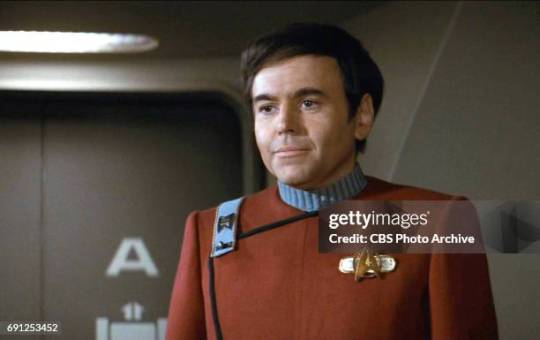
Thanks for coming to my TED talk.
6 notes
·
View notes
Text

Chekov Prismacolor #8 he's soooo cuuuuute
2 notes
·
View notes
Text
"Innocence" Continued
The trouble with being autistic is that you lose sight of the fact that your supporting-character blorbo is not the main character. The main character of the original Star Trek series and the films that followed was James T. Kirk. Not Pavel Chekov.
But that being said, what is Chekov’s place in the films and particularly the film considered the franchise masterpiece, The Wrath of Khan (1982)?
Well, Chekov being the Russian character in a series produced during the Cold War served as a reminder that certain TOS episodes were meant to be deliberate political commentary. In The Wrath of Khan, Chekov is working with a group of scientists to test a technology that the scientists fear could be turned into a weapon—which it ultimately is thanks to Chekov being turned into a mass murderer’s puppet. Read into that what you will.
But The Wrath of Khan is otherwise very not political, at least not to me. A short Tumblr post I read the other day reminded me of the fact that The Wrath of Khan is about Jim Kirk having to face the fact that he is growing older.
What role does Chekov play in this theme, you ask? I would say a big one.
To reiterate what I said in my previous meta post about Chekov, Chekov in the series is the mentee to Kirk and the other senior officers. He’s the young, ‘innocent’ boy who gets into trouble every once in a while. You could say he’s the son or the little brother figure to the other characters.

Chekov starts out The Wrath of Khan not on the Enterprise but on the Reliant as second-in-command. Think of him in that position as an adult child who has moved away from home. It is in this role that Chekov gets into easily the worst trouble he has ever been in his life. He is a pawn in Khan’s revenge on Kirk—Khan is hurting Chekov because of his hatred of Kirk, using him to get to Kirk. And Kirk isn’t there to get Chekov out of trouble until it is far, far too late.
Even though Chekov has ‘moved out’, Kirk still thinks highly of Chekov. There is a deleted scene reconstructed from surviving audio: Saavik calls the officers in Kirk’s quarters to announce that the Reliant is approaching.
youtube
Kirk states “Chekov is on Reliant, isn’t he?” He is expecting the meeting with Reliant to be a friendly encounter.
The hijacked Reliant ambushes the Enterprise. Kirk asks “Where is the crew of the Reliant?”—a courtesy to ask about his Starfleet colleagues, to be sure, but he is also asking after Chekov.
[Now, at this point, Captain Terrell and Chekov are both still with Khan but not on the bridge. Khan likely threw them in the brig. They are both likely suffering badly from the effects of the Ceti eel. They are both very lucky that they weren’t collateral damage in the Enterprise counterattack. Of course, all that matters to Khan is that if they’re alive, he can make use of them.]
(Side note: does anyone want to talk about the fact that Kirk, McCoy, and Saavik’s arrival on Regula-1 is staged like a horror film?)
At the Regula-1 station, Saavik finds Terrell and Chekov in the locker, both looking like they’ve been left to die. Their injured state, Chekov telling him part of the truth about how Khan used them, all of it is part of the set-up to lower Jim Kirk’s defenses. Kirk takes it hook, line, and sinker. “Easy, Pav”, he says to Chekov, touching his face to see if he’s okay.

They’re well enough to walk, and Kirk does not mind them following him to the Regula moon to find Genesis. He may even want to keep Chekov close to keep an eye on him.
(Shoutout to Kirk for killing the Ceti eel with fire)
After Terrell dies and Chekov goes down, Kirk sends a direct message to Khan:
“Khan, you bloodsucker! You’re going to have to do your own dirty work now. Do you hear me? DO YOU?...You’ve managed to kill just about everyone else, but you’re a poor marksman. You keep missing the target!”
Kirk’s spectacular anger here is justified. He just saw Captain Terrell kill himself after failing to assassinate him. And then, more personally, he just saw Chekov fail to assassinate him and then collapse to the ground and have a live parasite crawl out of his ear. And this on top of everything else—the skirmish that killed/injured a lot of young cadets, and then the obvious torture that Khan put Terrell and Chekov through. Khan has shed a lot of blood and caused a lot of pain and suffering just to get at Kirk—caused pain and suffering on people who have nothing to do with this one-sided feud, people who didn’t deserve it. And Pavel Chekov, one of his oldest and closest friends, was one of the victims. And he was used to victimize others.

[Chekov is on the floor behind McCoy]
But Chekov’s arc in The Wrath of Khan doesn’t end there. During a low point in the battle of the Mutara Nebula, Chekov shows up on the bridge, somewhat recovered from the Ceti eel.
“Could you use another hand, Admiral?” “Man the weapons’ console.”
Chekov smirks. He’s back on the bridge under Kirk’s command just like he was in the good old days. It’s payback on Khan for both Kirk and Chekov. Chekov fires off the torpedoes that leave the Reliant dead in the water. Kirk is able to defeat an old enemy from his past when all of his former friends are together.
How does this fit in with the theme about Kirk confronting his old age? When you get older, the people who were younger than you growing up, the people you raised and mentored, are now grown-up and independent. They’re making their own choices. You aren’t going to be there to save them from their problems. It is inevitable you will be on different sides of conflict. Disappointment and even betrayal can come between you.
But you still love and care about those people. And sometimes your ‘younger’ friends can come back and be there for you. While your old sins and your old enemies can come back to haunt you, at the same time the good influence you have on people around you can come back to benefit you.

12 notes
·
View notes
Photo

i think I just made Vulcan propaganda oops
1K notes
·
View notes
Text

aquarium activities for your vulcan
2K notes
·
View notes
Text

effigies of the emissary
I have had this odd headcanon that post-Sisko-ascension, all images or sculptures of him would be altered to remove his face... Since the prophets are a collective identity, it wouldn't make sense that one of them should get to be individual — so, as Sisko sacrifices himself and gives up his mortality, he also gives up his face, his body, himself... etc. Not sure how this came about since i started this thing months ago now so just take it. Lawl
737 notes
·
View notes
Text

Chekhov was a liberal arts major???
#WE LOVE TO SEE IT#tos#pavel chekov#my goat#what a guy#little silly goofy time? but what if i’m serious?
6K notes
·
View notes
Photo
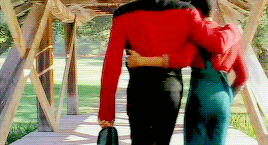
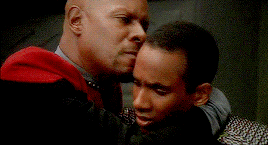
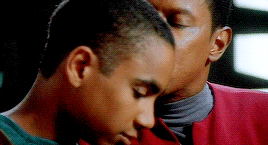
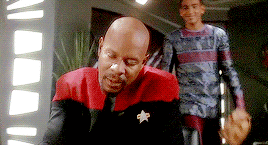
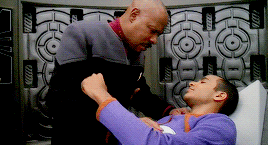
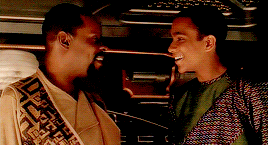
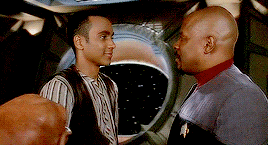
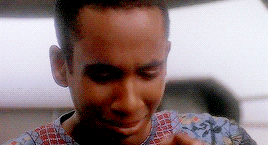
Benjamin and Jake Sisko moments
5K notes
·
View notes
Text

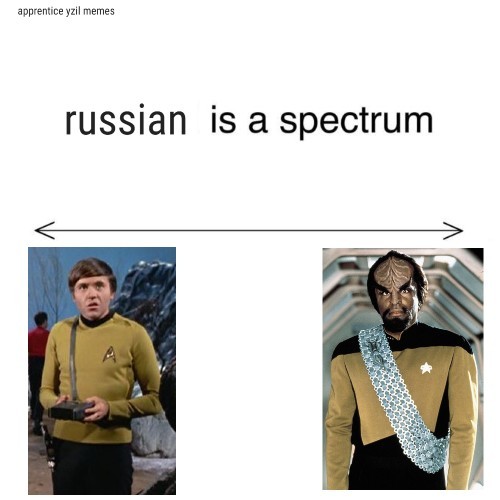

Some memes for my Chekov girlies out there (and for people who like Star Trek in general)
1K notes
·
View notes
Text




templars be damned my boy can work a grill

who up dragoning their age
309 notes
·
View notes
Text

I rewatched that weird Jack the Ripper episode for some reason. and bones’s line about Scotty hating women is so odd when he’s like the most chivalrous, softhearted character in the show. And he proceeds to act completely mortified at the prospect of killing those women for the rest of the episode. Bro was on the verge of tears. Honestly wasn’t expecting how much I’d like Scotty when I started TOS. I feel like he’s actually everything the fandom flanderizes Kirk to be.
#I’ll never understand why they tried to make it canon that Scotty hates women#it simply doesn’t exist to me#tos#montgomery scott#we love to see it
375 notes
·
View notes
Text
My son, Chekov.

Don't worry, he's in very good hands.
Original photo:

196 notes
·
View notes
Text
Sulu!!

I told the truth and I have now drawn Sulu! I really wish he got more screen time in tos, and I wish we got to know him more. I also just absolutely love George Takei ❤️❤️❤️
27 notes
·
View notes
Text
Fuck you *cars your ds9*

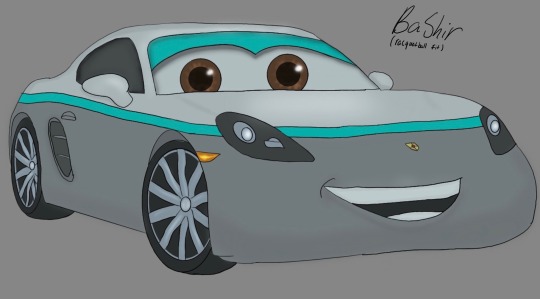
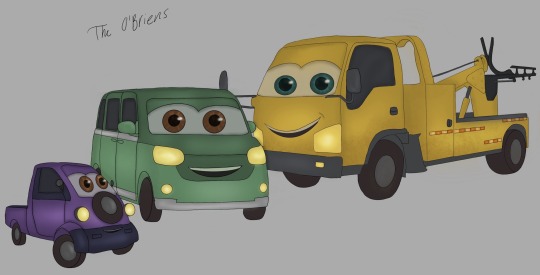






#thinking about when I went crazy and had to make ds9 into cars#making this has permanently affected how I see cars#when I drive all I see is ds9#you can really tell when i started taking this seriously
44 notes
·
View notes
Text

Looks like Falcon has gotten ahold of Bashir yet again!
373 notes
·
View notes
Text

C H E K O V
#she tholian on my web till I mutiny#TOS#Pavel Chekov#I’m completely normal about this man#my art#star trek#tholian web
15 notes
·
View notes
Text

I feel so untouched & I want you so much
quick study 4 a shitty day
817 notes
·
View notes